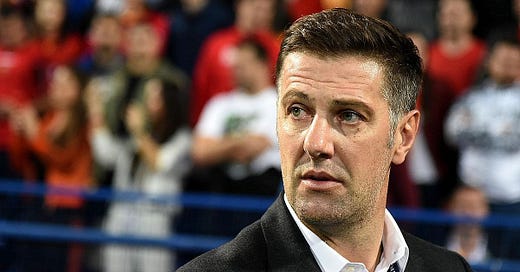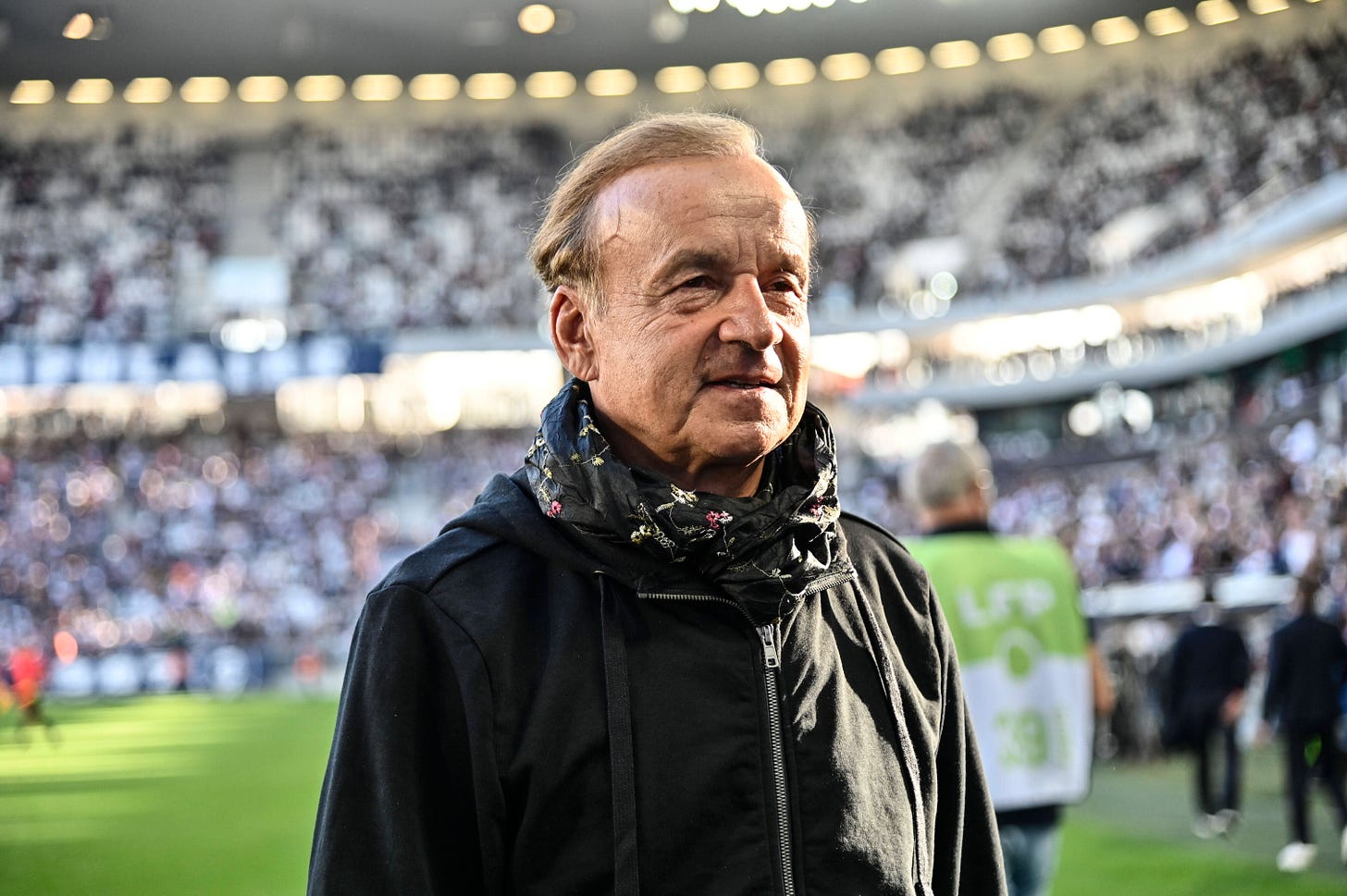Prognostication by precedent
Mladen Krstajic, if appointed, would be the worst manager to ever coach the Nigeria national team
It was in ‘Anna Karenina’ that Leo Tolstoy famously wrote: ‘Before any definite step can be taken in a household, there must be either complete division or loving accord between husband and wife. When their relations are indefinite it is impossible for them to make any move.’
It has now been over two weeks since Nigeria played out the 1-1 draw against Cape Verde that assured a place in the Third Round of 2022 World Cup qualifying. That result and performance, while adequate in a big picture way, proved less palatable to fans and observers alike, and brought to a simmering boil the antipathy toward coach Gernot Rohr from fans and the Nigeria Football Federation (NFF) alike.
However, in defiance of Tolstoy’s 150-year-old wisdom, it now appears that not even complete division is enough to spur decisive action in any direction. While, according to many reports, there is unanimity with respect to relieving the German -- and depending on who you believe, it has already happened -- there has yet to be any official missive advising on his present state of employment.
In another 41 days, the Super Eagles will kick off their 2021 Africa Cup of Nations campaign against Egypt. If, as is suggested, Rohr is yesterday’s news, then the choice of his replacement becomes critical in light of the short turnaround, especially if the idea of an interim coach is off the table. Not only will the NFF’s choice impact the preparation and execution of the AFCON, but it would also have repercussions where qualifying for the World Cup in Qatar is concerned, seeing as the Playoffs are slated for March, a mere month after the ructions conclude in Cameroon.
It is, then, a concern to hear the name of Mladen Krstajic being mooted for the role. The Serb seems, at this time, to be the only concrete link too, which is even greater cause for alarm. Not only would Krstajic be -- by a distance -- the worst coach to have ever sat in the dugout for Nigeria, but the simple fact that his name was not dismissed out of hand the instant it was mentioned suggests Nigerian football is headed nowhere under the leadership of Amaju Pinnick.
If that seems an overly harsh judgment, it is worth taking a look at the 47-year-old’s managerial career to date.
A former international defender, Krstajic’s first brush with coaching came as an assistant to former Serbia national team manager Slavoljub Muslin. He was handed the role, with no prior experience, purely because Fudbalski savez Srbije (FSS) -- the Serbian FA -- wanted a token former international as part of Muslin’s backroom and former Manchester United defender Nemanja Vidic refused the role.
Muslin was an experienced manager whose 27-year coaching career at the time had taken in spells in nine different countries, most notably Russia and France. (Incidentally, Rohr’s most vaunted achievement as a manager -- leading Bordeaux to the UEFA Cup Final in 1996 -- came off the back of the Serbian’s work getting the team to the quarterfinals; this is not the final parallel between the two managers, as will become obvious.)
Appointed in 2016, his brief was to qualify Serbia for the 2018 World Cup from a group featuring, in Wales, Austria and Ireland, three teams that had, unlike Serbia, qualified for Euro 2016. The former Red Star manager set about his task, and by the end of qualification, the Eagles stood atop Group D, two points clear of Ireland with just one defeat from 10 matches, having averaged two goals a game.
As it turned out, reaching the World Cup for the first time since 2010 was not enough. There was discontent from the Serbian FA over Muslin’s style of play -- which, in fairness, was not the most exciting -- as well as his refusal to recall Lazio midfielder Sergej Milinkovic-Savic (having reached an understanding with the player that he did not fit the team’s tactics), and so the 64-year-old was shown the door mere weeks after the decisive final qualifier against Georgia. “We parted ways because we didn’t think alike on how the team should look for the World Cup in Russia,” Muslin said.
There was, however, no candidate lined up to replace him, so just like that Krstajic was thrust into a caretaker role that eventually metastasized into a full-time contract when the obvious, popular candidates (including but not limited to current boss Dragan Stojkovic and former Fulham manager Slavisa Jokanovic) declined to accept a clear hospital pass.
What followed was unfettered bedlam.1
First, with just four months to go till the World Cup, Krstajic stripped Branislav Ivanovic of the national team captaincy, and handed it to Aleksandar Kolarov, with Nemanja Matic deputizing. While Ivanovic, at 34, was no longer the player he once was, such a drastic move for minimal gain made little sense.
Then, when the squad list for the World Cup was announced, there was further intrigue with the absences of Mijat Gacinovic and stalwart defender Matija Nastasic. The former, on the back of a strong season in the Bundesliga with Eintracht Frankfurt, was passed over for the less impressive Andrija Zivkovic and Nemanja Radonjic; the latter, ostensibly dropped due to an injury sustained in a 3-2 Bundesliga defeat to Hamburg with former club Schalke, would later allege that, contrary to Krstajic’s claims, he never received any direct communication or explanation for the decision, and would not play for the national team anymore as long as Krstajic was in charge.
“It is a dream for every player to perform at the World Cup,” Nastasic said. “They didn't even tell me why I was crossed out, the injury is not the reason. What disappointed me the most was that he didn't even call me. I’m not saying goodbye to the national team forever, I will just not play while Krstajic is the selector.”
That latter sentiment would prove a popular refrain, as midfielder Luka Milivojevic arrived at the same decision months after the World Cup.
However, let us not skip too far ahead.
At the World Cup, Serbia finished third in Group E, behind Brazil and Switzerland. However, their defeat to the latter provided some of the most controversial moments (with allegations made against referee Felix Brych and the subsequent fine meted out to Switzerland for the political celebrations of Granit Xhaka and Xherdan Shaqiri) of the competition, and exposed Krstajic’s lack of tactical acumen.
His decision to go for the win in the final 10 minutes despite holding all the aces with the score at 1-1, and to do so by substituting a holding midfielder, left Serbia wide open and handed the initiative to the Swiss, who were only too happy to oblige. The image of Shaqiri running the length of the Serbian half unimpeded to score in the 90th minute was scarcely believable, and that decision ultimately doomed the Serbs.
“I think we should have been more experienced and played for a result in the last 15 minutes [against Switzerland], we tried to take risks where in my opinion we did not have to,” Milivojevic said afterward. He was promptly dropped for the final group match against Brazil, which Serbia unsurprisingly lost.
Krstajic remained in the post, however, for another year until an infamous 5-0 away defeat to Ukraine sealed his fate. Along the way, there were more fallings out and even greater acrimony: left-back Ivan Obradovic refused a call-up in March 2019, telling Alo, “I simply do not want to play for the national team while Mladen Krstajic is the selector. That is my final decision,”; in the same month, Nikola Maksimovic was left out on account of injury, despite playing for Napoli just before the international window.
In all, Krstajic’s win-draw-loss record over 19 matches was largely positive. However, five of his nine wins were accounted for by China, Lithuania and Bolivia. By the time he was relieved of the role, everyone in Serbia was only too happy to see him gone.
The parallels should, at this point, be all too apparent.
Nigeria has a former Bordeaux manager in state, and are set to (officially, at least) sack him for playing uninspiring football, without having a clear succession plan. It is into the exact same situation wherein Krstajic so luridly failed four years ago that the NFF are looking to thrust him.
There is broader administrative common ground as well: speaking with the now-defunct football website ‘In Bed With Maradona’ in 2011, (current Serbia manager) Stojkovic said:
“There is no feeling of responsibility and no professional mindset. People don’t do their jobs; they want to do something different. They don’t know how to do it, but they put their noses in the wrong place. The president of the FA doesn’t qualify for the World Cup – the players qualify for the World Cup. They want to put themselves on the front page.”
Sounds familiar, does it not?
The decision to appoint Krstajic set Serbian football back, wasting a talented group of young talents with poor tactical decisions, petty beef, dishonesty and gaslighting. His unwillingness to communicate the rationale behind his decisions to players also alienated a number of the more experienced cadre, and calls into question his man management.
While it is possible that the 47-year-old has been humbled by the experience and is better for it, it is also unlikely: since his sacking, he has had one other job, and his stint there lasted nine months.
To turn an already precarious situation over to a man given to such volatility would be an unfortunate own-goal. Even worse, it would be such an easily avoidable one, and is so transparently a bad idea that one wonders if self-sabotage is not the aim here.
The object here is not to argue, of course, that sacking Rohr is a bad idea in itself. For all that the parallels with Muslin are strong, the Serbian had been in charge for just over a year; his German counterpart has been incumbent for five years, and so has less of an excuse for not improving the team’s playing style. However, to get rid of Rohr at this time, only to install Krstajic, would be egregious in the extreme.
Then again, few things define Nigeria more than rewarding and willfully rehabilitating historic failure.
The recounting of Mladen Krstajic’s time in charge of the Serbia national team owes a great deal to an illuminating Twitter thread by ‘Serbian Football’.





